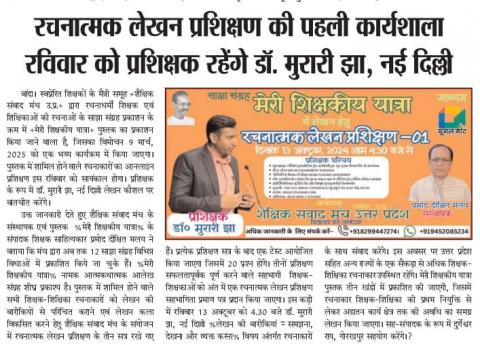
Why Teachers Must Write
In the world of education, the voices of teachers are often left unheard, yet they are the closest to the pulse of the classroom. Recently, I had the privilege of speaking with a group of teachers about the power of writing, especially for those in our profession. As a teacher and mentor myself, I have witnessed how the act of writing can transform not just educators but the entire educational ecosystem.
Teaching is a profession that shapes lives, but when it comes to reflecting on those experiences and sharing them, we tend to fall short. As I addressed the group, I felt a deep connection to their struggles. Many of these teachers work with limited resources, often in remote areas, and face difficulties in just getting to their schools. Yet, they remain committed to their students and are driven by the desire to learn and grow as educators.
The Role of Literature in Creating Change
Throughout history, literature has played a key role in social change. Take, for example, Dalit literature, which arose from the struggles of marginalized communities in India, or feminist literature, which has united women across the globe in their fight for equality. These narratives not only connect people but also inspire collective action.
Similarly, in the field of education, teacher narratives can create a significant impact. When teachers document their experiences, they contribute to a collective body of knowledge that has the potential to influence policy and reform. There is a glaring gap in literature when it comes to the voices of teachers. Much of what is written about education comes from those who are not on the ground in the classroom. These outsiders may visit schools, speak to a few teachers, and write their observations, but what is missing is the lived experience—the daily challenges and triumphs that only teachers can articulate.
Why Teacher Writing Matters
When I posed the question to the group in my workshops—how many of them regularly read educational literature—the response was disheartening. Very few could name even a single magazine or book dedicated to teacher narratives. However, the case with this group was different, as most teachers were aware of some teacher magazines and books. In a country with over 28 crore children and around 1 crore teachers, the lack of written documentation from educators is troubling. The lives of teachers, their interactions with students, and their unique experiences are not captured in the public domain, leaving a void in our understanding of the education system.
Writing is not just about sharing our successes but also about expressing our vulnerabilities. The classroom is a dynamic space where things rarely go as planned. This unpredictability is what makes teaching a deeply human and transformative experience. When we write about our classroom experiences, we reveal the complexities of teaching, and in doing so, we contribute to a richer, more nuanced understanding of education.
Writing as a Tool for Reflection and Growth
I often emphasize the importance of reflective writing, encouraging teachers to keep a daily journal of their experiences. Even simple observations, like noting how students shared their lunch or how a particular lesson sparked curiosity, can become valuable insights over time. These reflections may seem small, but when collected over months or years, they form a powerful narrative that offers both personal and professional growth.
For instance, if a teacher writes about the ways in which they connect with their students, they may begin to see patterns—perhaps certain approaches foster stronger bonds, or particular methods encourage students to engage more deeply with the material. By reflecting on these experiences, teachers can develop a deeper understanding of their practice and make informed changes to improve their teaching.
Moreover, writing has the power to make our work immortal. Just as we read books written centuries ago and learn from the experiences of those long gone, the narratives we write today will serve as a record for future generations of educators. Our stories will not only reflect the current state of education but also provide insights into how we navigated the challenges of our time.
The Need for Teacher-Driven Educational Literature
The time has come for teachers to take control of the narrative surrounding education. We can no longer rely on policymakers, researchers, or academics to tell our stories for us. If we want education policy to truly reflect the needs of teachers and students, we must write. Our lived experiences, documented in the form of reflective notes, essays, and books, will inform and influence future reforms.
In conclusion, writing is not just a personal act of reflection—it is a political one. By sharing our stories, we can challenge the dominant narratives about education and contribute to a body of literature that is grounded in the realities of the classroom. So, let us write, not just for ourselves, but for the generations of teachers and students who will follow.
- Log in to post comments
